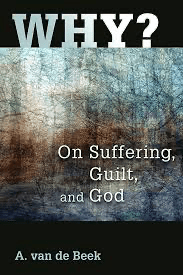“Why?” Chapters 21: “Prayer and Argument”
”Why? On Suffering, Guilt and God” by Abram van de Beek (Wm. B. Eerdmans, 1990) is the book some of us have been discussing here. I am now going to comment on Chapter 21 which, I believe, is one of the most crucial chapters.
Chapter 21 is titled “Prayer and Argument.” Here vdB argues that “man” is not merely passive in the outworking of God’s plan. “The relationship between God and man is not simply that of giver and receiver. Man is not purely passive. We are permitted to be something for God because God has willed it. The Spirit effects the coming of the kingdom through speaking, thinking human beings.” (318) That pretty much sums up the chapter and it has been hinted at throughout the book. VdB is no Calvinist!
Then, in the same chapter, vdB continues by emphasizing the power of prayer to change what happens. And that because God chooses to give “man” some manner of influence on him. He does not “do it all himself.” We, human beings, are heard by God and what we say in prayer (and prayer is always with words!) can change the direction of things. On the other hand, according to vdB, human participation through prayer (and other acts) cannot make the kingdom come when and how and where we wish. “There is good reason why the realization of the kingdom is a divine work requiring the involvement of the Spirit of God himself. Humans may make their contribution, but they do not see everything that is being contributed.” (321)
Next, in this chapter, vdB returns to the human contribution to the ways of God towards the end-goal of history. He spends three pages exegeting the God-Moses debate in which Moses changes God’s mind through argument. He takes the narrative quite literally. (And what would it mean if not literally?) Vdb: “Moses is here in conversation with God; he is a human who argues with God; a human who persuades God to change his mind and points a way for God to go, not in some minor issue, but in the matter of God’s choice for Israel as a channel of blessing to the nations.” (325)
The point is that “In situations of guilt and suffering we are not called to be passive, but to call on God to give signs of the coming kingdom.” (326) Perhaps vdB becomes even more controversial when he continues to argue that it is perfectly okay to dispute with God. (331) “One who enters into dialogue with God can sometimes persuade God. Another time a person is persuaded by the Spirit of God.” (331)
According to vdB the Bible calls us, through the examples of Moses and Job, to “battle it out with God.” (332) He even suggest that neglecting to do battle with God in instances of guilt and suffering is an error of omission.
VdB here expands “spiritual warfare” to include war (argument) with God!!
This is relational theology without process thought. This is a major reason why “Why?” Appeals to me so much. As I said before, I was dismayed in seminary by both “classical theism” and “process theology.” I knew in my heart of hearts there had to be a different way to think about God and us. And I was raised in church to think in that different way, but nobody in my tradition had explicated it in anything like a scholarly or academic way. The way it was explicated in sermons and lessons was filled with contradictions and that was often said to be a virtue! I read my Bible before I read theology. I already had a “picture” in my mind and in my heart of God as one who freely allows us to influence him and his ways. Classical theism left me cold; it felt to me either deistic or pantheistic and made God feel remote or uncaring. My faith was firmly planted in the God of the Bible and especially Jesus Christ even if that meant “picturing” God as more anthropomorphic than traditional theism or process theology.
My eyes were opened by Robert Jenson’s “God after God.” (And, yes, I think it would be a good idea to discuss that book here.) Then I read on in that same motif of a God who is faithfully changeable (H. Berkhof). It seemed to me that Barth was of two minds about this. Brunner (in Dogmatics, volumes 2 and 3) came very close to the truth. Hendrikus Berkhof and Juergen Moltmann were moving in the right direction. Then I read van de Beek and sensed that I had finally found a scholarly, academic, biblical theologian with the courage to say it and say it well—that the God of the Bible is truly interactive with us while remaining free.
In about a week to ten days I will continue here with the next chapter in “Why?”
*Note: Do not comment if you have not read this chapter in “Why?” You may ask a question. If you comment or ask a question, keep it relatively brief (no more than 100 words), on topic, addressed to me, and civil and respectful (not hostile or argumentative) and devoid of pictures or links.*













